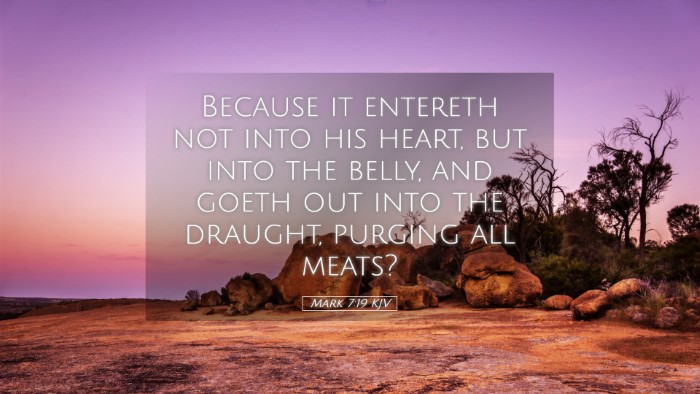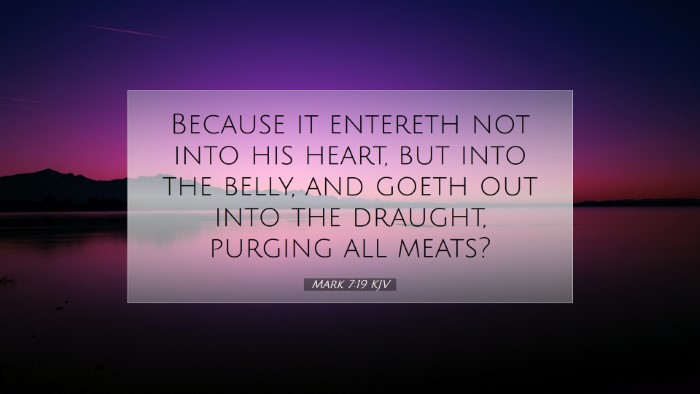Commentary on Mark 7:19
Verse Context: Mark 7:19 states: "Because it enters not into his heart, but into the belly, and goeth out into the draught; purging all meats." This verse is part of a larger discussion where Jesus addresses the Pharisees and scribes concerning their traditions and misunderstandings of purity.
Understanding the Passage
This passage highlights the distinction between ceremonial purity and moral purity. Jesus emphasizes that it is not what goes into a person's mouth that defiles them, but rather what comes out of their hearts. This teaching reframes the understanding of defilement and serves as a critical point in Jesus' ministry.
Insights from Commentators
Matthew Henry's Commentary
Matthew Henry observes that the Pharisees' emphasis on ritual purity was not aligned with the spirit of God's law. He explains that the issue lies not in external compliance to traditions, but in the condition of the heart. Henry notes:
- The heart is the seat of intentions and thoughts; thus, true defilement arises from evil thoughts, adulteries, and lusts (cf. Mark 7:21-23).
- Food does not affect our spiritual state; rather, it is our actions and words, which stem from the heart, that reflect our true character.
Albert Barnes' Notes
Albert Barnes provides a theological exploration of the implications of this verse. He stresses:
- The phrase "goeth out into the draught" signifies that the physical act of eating has no long-lasting spiritual impact. This indicates the ephemeral nature of physical sustenance compared to spiritual well-being.
- Barnes links this to larger themes of the Gospel: Jesus came to not only fulfill the law but also to transform the understanding of righteousness. The external practices should not replace an inner change of heart.
Adam Clarke's Commentary
Adam Clarke emphasizes the cultural context of the Jewish dietary laws. He expounds on how Jesus challenges these established conventions:
- Clarke explains that the food ordinances were originally given to set Israel apart; however, their overemphasis led to a misunderstanding of God's intentions for holiness.
- He points out the inclusiveness of Jesus' declaration: it leads to a broader interpretation of whom God accepts. This radical teaching was a precursor to the inclusion of Gentiles into the faith.
Theological Implications
The message in Mark 7:19 transcends the immediate audience of Pharisees and touches on universal themes relevant to all believers. Several key theological implications arise:
- The Nature of True Holiness: Holiness is not merely external adherence to laws but is fundamentally linked to the inner transformation by the Spirit of God.
- The Importance of the Heart: A believer's thoughts, intentions, and emotions deeply impact their spiritual life. The heart must be aligned with God’s will to avoid moral defilement.
- Challenge to Legalism: The passage serves as a challenge to legalistic interpretations of faith, which often prioritize the letter of the law over the spirit of love and grace.
Application for Today's Believers
In a contemporary context, this verse invites Christians to reflect on their personal practices of faith:
- Inner Reflection: Regular self-examination is essential to ensure that our actions and words are consistent with a heart transformed by Christ.
- Prioritizing Relationships: It urges the faithful to focus on building sincere relationships with others that reflect the love of Christ rather than strict adherence to religious norms.
- Evangelistic Outreach: This teaching encourages believers to share the inclusivity of Christ’s message with others, breaking down barriers that prevent individuals from experiencing God's love.
Conclusion
Mark 7:19 serves as a critical reminder that true spirituality is not defined by external rules but by the condition of one's heart. Insights from respected theologians like Matthew Henry, Albert Barnes, and Adam Clarke deepen our understanding of this profound truth. Believers are called to cultivate a heart that seeks after God and expresses His love, thus embodying the fulfillment of His law through the grace of Jesus Christ.


